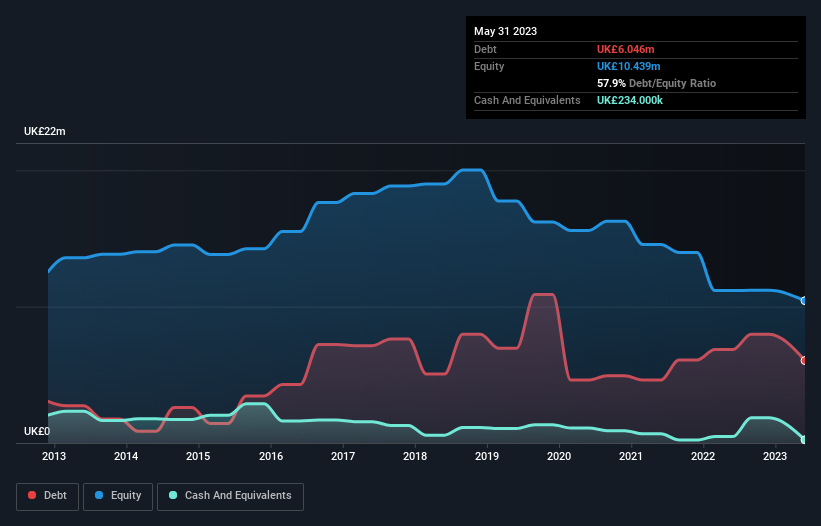- United Kingdom
- /
- Retail Distributors
- /
- AIM:LDSG
Leeds Group (LON:LDSG) Has Debt But No Earnings; Should You Worry?
Howard Marks put it nicely when he said that, rather than worrying about share price volatility, 'The possibility of permanent loss is the risk I worry about... and every practical investor I know worries about.' When we think about how risky a company is, we always like to look at its use of debt, since debt overload can lead to ruin. As with many other companies Leeds Group plc (LON:LDSG) makes use of debt. But should shareholders be worried about its use of debt?
When Is Debt A Problem?
Debt and other liabilities become risky for a business when it cannot easily fulfill those obligations, either with free cash flow or by raising capital at an attractive price. If things get really bad, the lenders can take control of the business. However, a more usual (but still expensive) situation is where a company must dilute shareholders at a cheap share price simply to get debt under control. Of course, debt can be an important tool in businesses, particularly capital heavy businesses. The first thing to do when considering how much debt a business uses is to look at its cash and debt together.
Check out our latest analysis for Leeds Group
What Is Leeds Group's Debt?
As you can see below, Leeds Group had UK£6.05m of debt at May 2023, down from UK£6.85m a year prior. On the flip side, it has UK£234.0k in cash leading to net debt of about UK£5.81m.

How Strong Is Leeds Group's Balance Sheet?
We can see from the most recent balance sheet that Leeds Group had liabilities of UK£7.30m falling due within a year, and liabilities of UK£656.0k due beyond that. Offsetting these obligations, it had cash of UK£234.0k as well as receivables valued at UK£3.20m due within 12 months. So it has liabilities totalling UK£4.52m more than its cash and near-term receivables, combined.
The deficiency here weighs heavily on the UK£2.87m company itself, as if a child were struggling under the weight of an enormous back-pack full of books, his sports gear, and a trumpet. So we definitely think shareholders need to watch this one closely. At the end of the day, Leeds Group would probably need a major re-capitalization if its creditors were to demand repayment. When analysing debt levels, the balance sheet is the obvious place to start. But it is Leeds Group's earnings that will influence how the balance sheet holds up in the future. So when considering debt, it's definitely worth looking at the earnings trend. Click here for an interactive snapshot.
Over 12 months, Leeds Group made a loss at the EBIT level, and saw its revenue drop to UK£24m, which is a fall of 18%. We would much prefer see growth.
Caveat Emptor
Not only did Leeds Group's revenue slip over the last twelve months, but it also produced negative earnings before interest and tax (EBIT). Its EBIT loss was a whopping UK£477k. Considering that alongside the liabilities mentioned above make us nervous about the company. It would need to improve its operations quickly for us to be interested in it. For example, we would not want to see a repeat of last year's loss of UK£761k. In the meantime, we consider the stock to be risky. There's no doubt that we learn most about debt from the balance sheet. However, not all investment risk resides within the balance sheet - far from it. These risks can be hard to spot. Every company has them, and we've spotted 3 warning signs for Leeds Group (of which 2 can't be ignored!) you should know about.
If, after all that, you're more interested in a fast growing company with a rock-solid balance sheet, then check out our list of net cash growth stocks without delay.
New: AI Stock Screener & Alerts
Our new AI Stock Screener scans the market every day to uncover opportunities.
• Dividend Powerhouses (3%+ Yield)
• Undervalued Small Caps with Insider Buying
• High growth Tech and AI Companies
Or build your own from over 50 metrics.
Have feedback on this article? Concerned about the content? Get in touch with us directly. Alternatively, email editorial-team (at) simplywallst.com.
This article by Simply Wall St is general in nature. We provide commentary based on historical data and analyst forecasts only using an unbiased methodology and our articles are not intended to be financial advice. It does not constitute a recommendation to buy or sell any stock, and does not take account of your objectives, or your financial situation. We aim to bring you long-term focused analysis driven by fundamental data. Note that our analysis may not factor in the latest price-sensitive company announcements or qualitative material. Simply Wall St has no position in any stocks mentioned.
About AIM:LDSG
Leeds Group
Engages in the property investment activities in the United Kingdom.
Moderate with mediocre balance sheet.
Market Insights
Community Narratives




